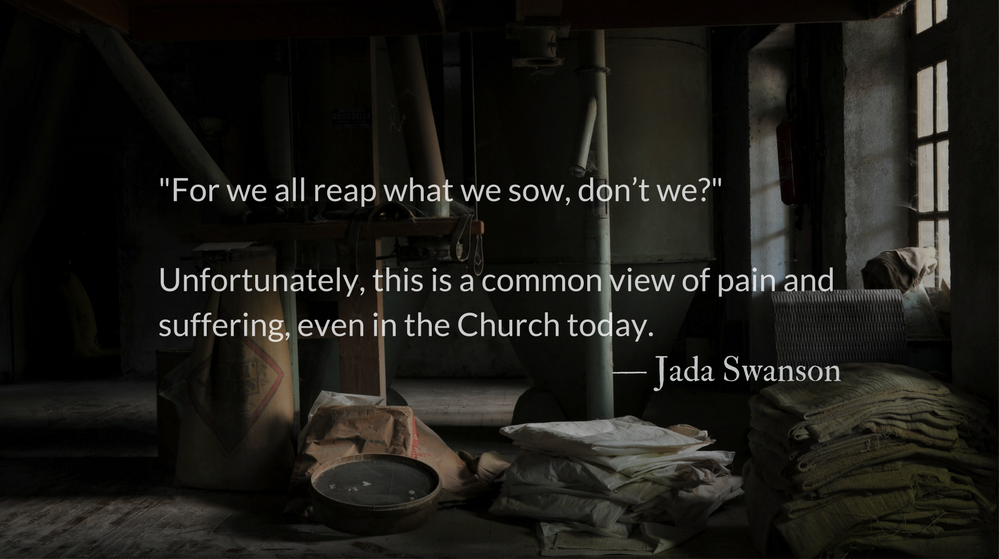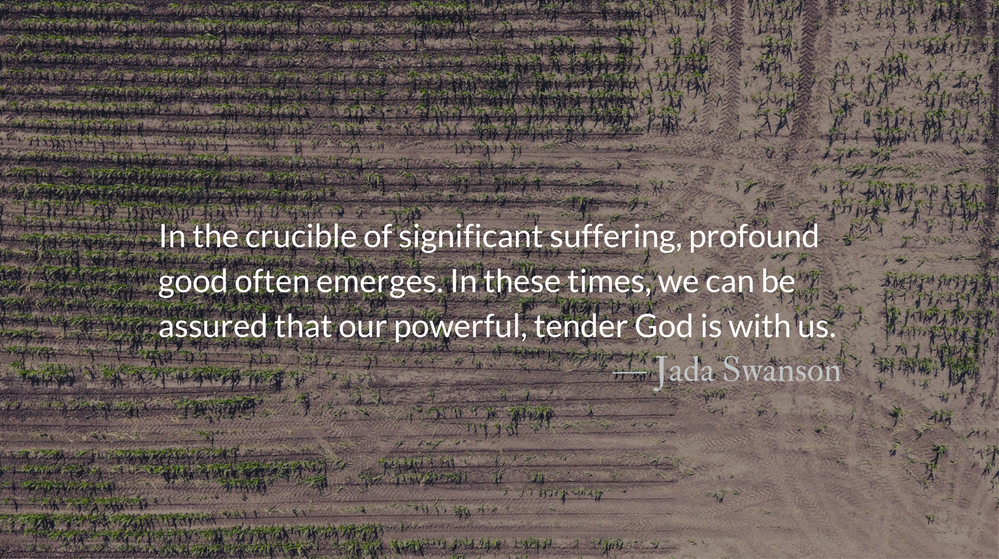Selected by reader, Michele, from Colorado
One can embrace a sense of confidence and peace. One can. It’s a voice. But do we? Can we embrace confidence and peace without sensing it? Maybe that’s a place to start.
Originally posted on February 5, 2018 with readings from Job 4 and Romans 8.
Think! What innocent person has ever perished?
When have those who do the right thing been destroyed?
As I’ve observed, those who plow sin
and sow trouble will harvest it.
When God breathes deeply, they perish;
by a breath of his nostril they are annihilated. — Job 4.7-9
Reflection: When Help Isn’t Help :: Readers’ Choice
By Jada Swanson
After seven days of silence, Eliphaz speaks to Job. Eliphaz is somewhat gentle and appears to sincerely attempt to bring comfort to his friend, Job. Yet, it doesn’t take long for one to see that his belief about his friend’s plight is that it is due to sin in Job’s life. In verse seven, he states, “Think! What innocent person has ever perished? When have those who do the right thing been destroyed?”
For we all reap what we sow, don’t we?
Unfortunately, this is a common view of pain and suffering, even in the Church today. No doubt, statements have been made such as, “I wonder what she did to bring this upon herself?” or “If you’re living right, you will surely have a blessed life.”
Yet, if this is an accurate assessment, it begs the question, “What had Job done to bring such pain and suffering into his life?” and “Wasn’t he ‘living right’?”
The reality is that God never promises that his children will have a life free of trial, hardship, pain, or suffering. In fact, James 1 tells us to consider it pure joy whenever we face such situations and circumstances, because the hardships one endures brings about perseverance, which is needed to become mature and complete.
Most certainly, “Considering it all joy” does not mean one rejoices in the cruelty, suffering, shame, injustice, or destruction. It does not mean there will be no tears or sense of loss. Rather, amidst these constraining circumstances, one can embrace a sense of confidence and peace.
Although Eliphaz meant well, his response was insensitive to his friend’s plight. It bears considering if Job’s circumstance brought to the surface some of his own concerns and vulnerabilities. Perhaps, he thought he had matters of faith and God figured out. Yet, God does not fit into a neatly packed box of predictability. In fact, we are told his ways are mysterious (Isaiah 55:9).
Everything is not always what it appears on the surface. Most often, there is more to the story, necessary details and nuances that hover just below the surface to which the public is not privy. As such, one needs to be careful in expressing personal opinions about the circumstances another is facing, regardless if this person is a family member, friend, or acquaintance.
May we understand that times of trial and hardship will come into our lives. May we embrace peace amidst suffering. May we listen to understand, not merely to respond. And when we do respond, may it be with sincerity and sensitivity.
Prayer: The Request for Presence
Hear the voice of my prayer when I cry out to you, when I lift up my hands to your holy of holies. — Psalm 28.2
– Prayer from The Divine Hours: Prayers for Springtime by Phyllis Tickle.
Prayers from The Divine Hours available online and in print.
Today’s Readings
Jeremiah 49 (Listen – 7:15)
Psalm 26-27 (Listen – 3:13)
Additional Reading
Read More from Jada about For Such a Time
God calls us to obedience during the dark and the daring moments of our lives. In his word, he has promised never to leave us or forsake us.
Read More about Room For Hannah
Church staff and attendees often reflect an unspoken belief that Christian Life has no place for sadness.
Readers’ Choice
We have a couple spots left for your favorite posts of the year. Submit a Readers Choice post. Tell us about a post and what it meant to you.
Support our Work
Over 4,000 people every week read an email devotional from The Park Forum. Support our work with a monthly or a one time donation.











